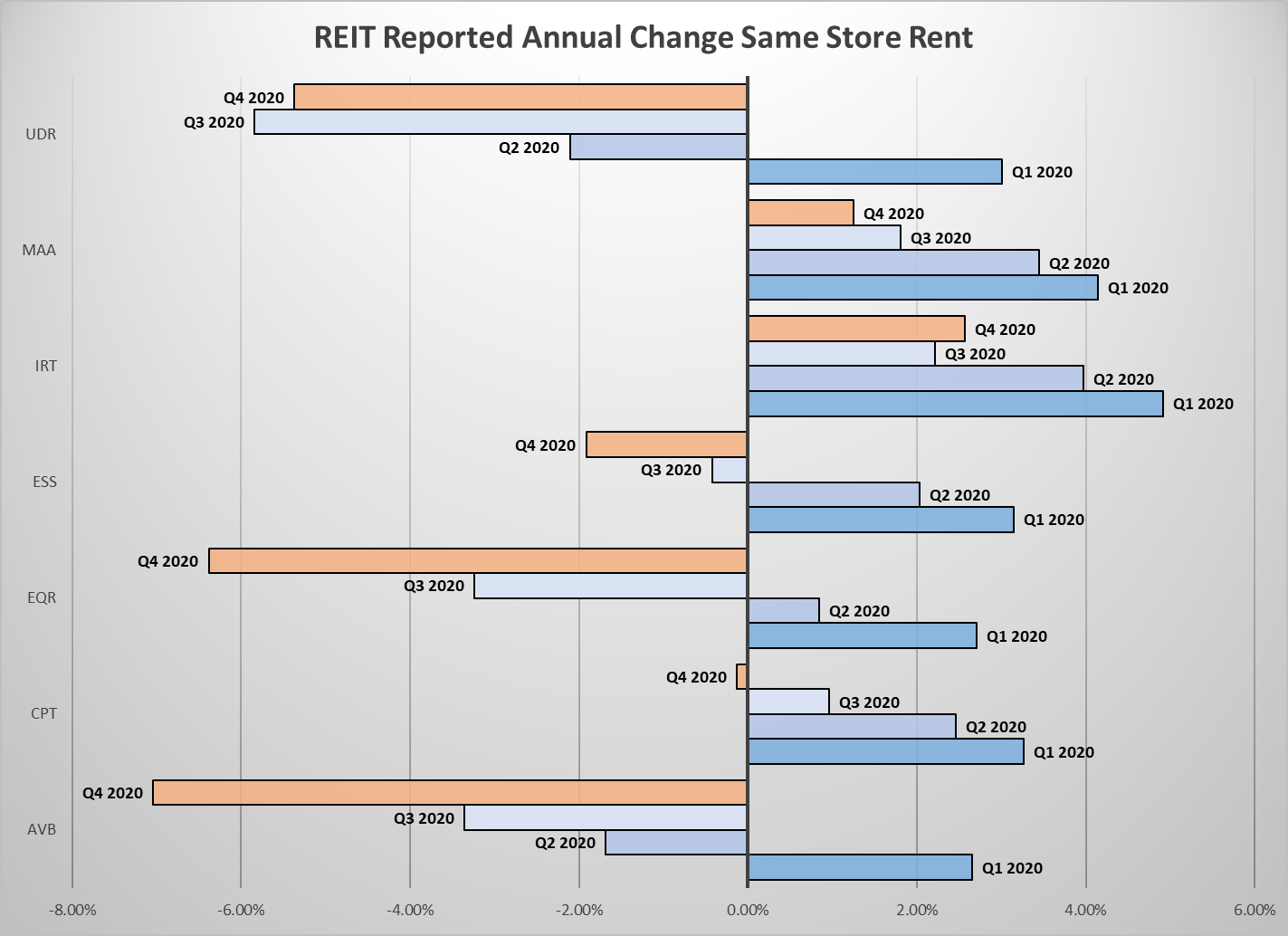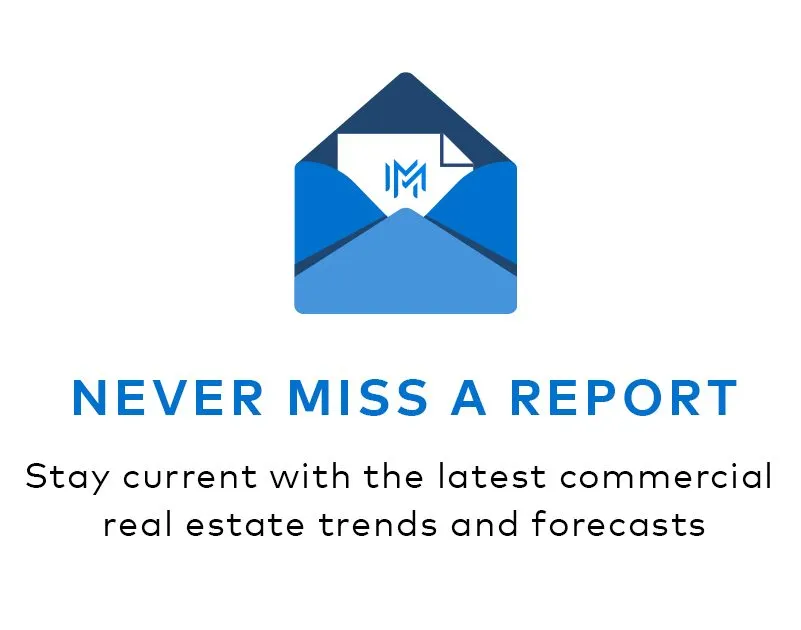Reported fourth quarter 2020 earnings from publicly traded multifamily REITs continued the trend of markedly divergent market performance. Portfolios with exposure to coastal gateway markets turned in negative year-over-year rent and revenue growth—with New York City, San Francisco and Los Angeles the worst-performing markets—while portfolios incorporating more suburban and Sun Belt markets showed remarkable resilience during the pandemic.
AvalonBay Communities Inc., Equity Residential and Essex Property Trust all have large footprints in coastal gateway markets, and all turned in sharply negative year-over-year portfolio rent and revenue growth.
More than 27% of AvalonBay’s portfolio is located in New York City, Los Angeles and San Francisco. Correspondingly, AvalonBay reported rent declines in excess of 10% for each of these markets, paced by San Francisco at -16.2%, resulting in an overall portfolio rent decline of -7.0% and rental revenue declining by -8.6%.
Timothy Naughton, AvalonBay Chairman & CEO, noted there were still many challenges and uncertainties to the near term outlook due to a combination of risk factors, including, “ongoing transmission of the virus and its variants; the rollout and efficacy of the vaccine; the continuation of work-from-home mandates; the extension of eviction moratoriums in most of our markets; and the size, distribution and impact of any federal stimulus that may be passed.” Given the uncertainty over the coming year, AvalonBay decided only to release quarterly earnings guidance in lieu of full year guidance. The rest of its multifamily peers released full-year 2021 guidance in their fourth quarter reporting.
More than 50% of Equity Residential’s portfolio is located in San Francisco, Los Angeles and New York City, and as with AvalonBay, year-over-year results were poor. Fourth quarter portfolio rents declined by -6.4% and revenue declined by -8.2%. No market that Equity Residential operates in had a positive change in year-over-year rental rates in the fourth quarter.

Weak revenue results will persist well into 2021: Q4 portfolio turnover increased by 2.7 percent to 13.4 percent, while new lease rates declined by -20.6 percent, renewal lease rates declined by -3.4 percent for a blended renewal rate of -13.0 percent. Despite extremely weak pandemic rent performance, Equity Residential President & CEO Mark J. Parrell remained committed to Equity Residential’s portfolio strategy: “Our affluent, well-employed resident base remains drawn to our nation’s great cities and we expect demand to accelerate and pricing to continue to improve as vaccines are widely administered and cities become more active.”
Essex Property Trust’s portfolio is entirely situated along the West Coast, however only 2.5 percent is in San Francisco. Compared to AvalonBay and Equity Residential, their locations tend to run more suburban and slightly more affordable. Accordingly, average portfolio rent declined a relatively modest -1.9 percent with Essex Property Trust reporting positive year-over-year rental rate gains in Orange County, San Diego, and Ventura County.
However, in Q4 2.7 percent of scheduled rent stood uncollected and occupancy declined on a year-over-year basis, combining to drive overall revenue lower by -8.0 percent. Happily, for Essex Property Trust, sequential quarter performance was better, with Q4 revenue increasing 0.3 percent over Q3 2020. Still management remained cautious about near term prospects: “Given difficult comparisons to one year ago, we expect year-over-year results to remain challenged through the second quarter of 2021, followed by a steady economic recovery and resurgence in rental demand assuming a widespread distribution of vaccines.”
THE SUNBELT SHINES
Conversely, Independence Realty Trust and MAA are REIT portfolios located primarily in suburban and sunbelt markets. They continue to report strong year over year and sequential quarter rent and revenue growth.
Independence Realty Trust, a relatively smaller portfolio containing roughly 14,000 units in 51 properties located in the Sunbelt and Midwest, reported average portfolio rent growth of 2.6 percent and revenue growth of 5.4 percent on a year-over-year basis. Throughout the pandemic, Independence Realty Trust has reported sequential and year-over-year rent growth. For Q4 only three of their markets recorded negative rent growth. Rent gains were led by Tampa – St. Petersburg, Fla. (+8.6 percent), Huntsville, Ala. (+7.8 percent) and Memphis, Tenn. (+4.8 percent).
Outside of 4,080 units in the Washington D.C. metro area, MAA’s same store portfolio of 95,113 units is completely contained within the sunbelt. Like Independence Realty Trust they have reported year-over-year and sequential quarterly rental growth throughout the pandemic. For Q4, MAA reported year-over-year portfolio rent growth of +1.3 percent and revenue growth +1.8 percent. Rent growth was paced by Huntsville, Ala. (+9.1 percent); Phoenix (+4.3 percent); and Charleston, S.C. (+3.3 percent). Fourth quarter portfolio occupancy increased 0.1 percent to 95.7 percent on a year-over-year basis.
In prepared remarks, Chairman & Chief Executive Officer Eric Bolton noted MAA carries good “momentum into 2021 and we continue to believe that we are early in a multiyear recovery cycle.” Indeed, in Q4 MAA reported renewal lease rates of 5.2 percent, a new lease rate growth of -2.5 percent combining for a blended new lease rate of 0.8 percent, suggesting that rental rates and revenue will continue to grow into 2021 for MAA’s portfolio.











Add Comment